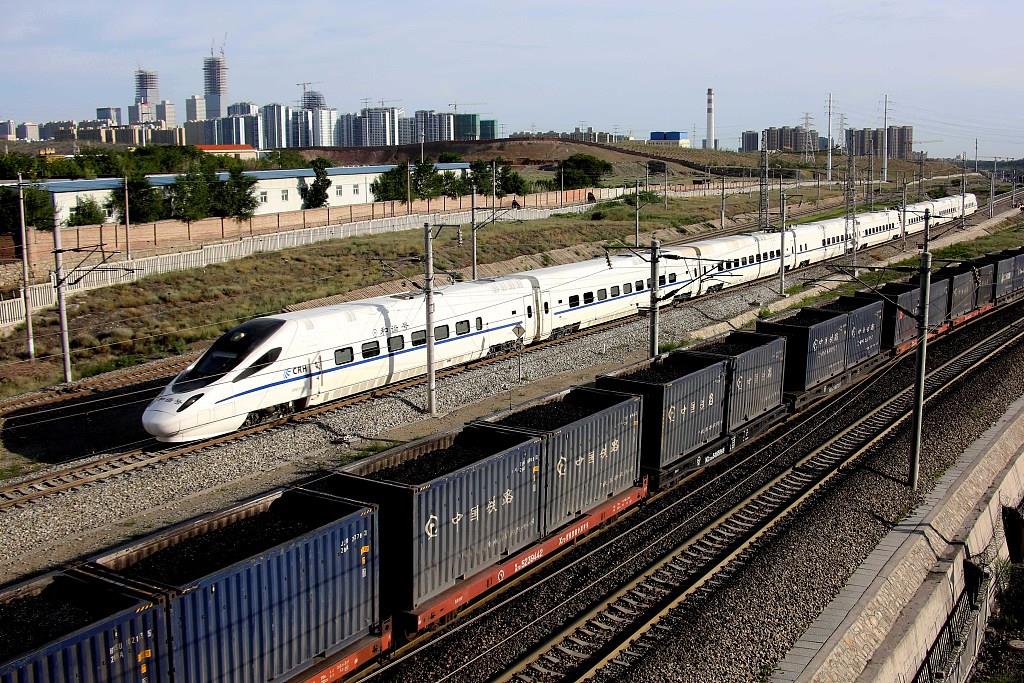
Rail cars outside the China Railway MA manufacturing facility in Springfield.
SPRINGFIELD — Unless there are major changes, about the best anyone can expect from China Railway and its massive rail car factory in Springfield is four new cars a month.
That’s about half the production China Railway promised when it first got the MBTA contract back in 2014. That contract is now 17 months to two years behind schedule. And the Springfield plant has not yet restarted shipping new cars to the T after a series of delays and quality control issues are now coming to a head.
Gov. Maura T. Healey, under pressure to fix troubles at the beleaguered T, and the MBTA have hired an independent team to evaluate and possibly improve China Railway’s operations.
But China Railway, the target rail-car maker in the world and an enterprise of the Chinese government, says it’s confident it can get production in Springfield back on track.
“Our vision for 2023 is to continue to: improve our planning, communication, and performance; further develop our workforce; bid and win additional transit contracts; and work with our transit partners to ensure the introduction of modern transit vehicles to the riding public,” said spokeswoman Lydia Rivera.
In 2014, China Railway received a $566 million contract from the MBTA to build the cars for the Orange and Red lines. In December 2016, the MBTA upped the order, requesting another 120 new Red Line cars, with production then set to begin in June 2022 at a cost of $277 million.
The state went without federal aid in that deal so it could mandate that the cars be assembled here in Massachusetts. The idea was to create an industry here that would outlive the contract.
It’s a revived, not a new, industry.
Wason Manufacturing Co., which was one of the largest makers of railroad cars and locomotives in the country, operated here from 1845 to the Great Depression. The Shelburne Falls Trolley Museum has a Wason trolley car.
For China Railway, 78 Orange Line cars have been delivered to Wellington car house, according to a report T management gave its board of directors last month.
All 152 Orange Line car shells have been produced. Seventy-eight are on at the MBTA’s Wellington car house, 48 are in the production line in Springfield and 26 are being stored waiting to enter the production line in Springfield.
Twelve Red Line cars are on site at Cabot car house, six are in production in Springfield, 14 are being stored in Springfield waiting to enter the production line, and 12 are in Changchun, awaiting shipment to Springfield. Two hundred and eight remain to be fabricated in China.
The T said China Railway stopped Red Line car shell production in November 2022 due to a surplus of car shells currently stored in Springfield, due to the backlog of 40 — 26 Orange, 14 Red — car shells waiting to enter production at Springfield.
But The T has asked that China Railway work on both types of cars con currently.
Also, China Railway said projects for the Los Angeles Metro and the Philadelphia-area’s SEPTA are proceeding with shells for those cars on the way.
China Railway in Massachusetts has a current workforce of more than 397 employees. The manufacturing facility in Springfield employs 348 employees, including 241 union production employees made up of Sheet Metal Workers Local 63 and Electrical Workers Local 7. Of these 241, 158 of these employees live in the city of Springfield with 90% of the staff living in Greater Springfield.
Rivera said the company has been hamstrung by tariffs, import duties imposed after China Railway signed its contracts have cost it $18 million on the MBTA work and are expected to cost China Railway $44 million in total on the T, SEPTA and the Los Angeles work.
Rivera also spoke of China Railway’s new training initiatives and a program of quality control audits that began in January.
The $80-million China Railway factory in East Springfield has a larger problem. China Railway hasn’t booked any jobs after the T, Septa and Los Angeles.
Federal law bars transit agencies from using federal money to buy from China Railway unless they have already established a relationship, said Erik Olson, executive director of the Rail Security Alliance. And with customers unhappy, they likely won’t line up to do more business. Even Los Angeles is rebidding part of its contract with China Railway.
He said China Railway has been awarded more than $2.6 billion in U.S. taxpayer-supported contracts to make passenger railcars for Boston, Chicago, Philadelphia and Los Angeles. Federal funding procured before the ban played a part in three of the four contracts. In the process, he said,China Railway endangers the domestic rail car industry despite the domestic industry focused on building freight rail equipment.
Olson represents domestic rail manufacturers and suppliers and the industry’s 65,000 family-wage jobs and earlier thsi month he urged the Biden Administration to maintain Section 301 tariffs on all railcar parts, as this represents U.S. policy that has spanned Republican and Democratic administration.
That means the Springfield plant might sit empty.
“I don’t know what it means for the future,” Olson, who lobbied in favor of the ban, said. “Our purpose is to raise these issues.”
But there are other international players looking for factories. And Springfield is well positioned. Another operator, such as Siemens, Huyndai, Kawasaki, or Alsom, could take over.
“That would be great,” he said. “I don’t know if that’s in the cards.”


